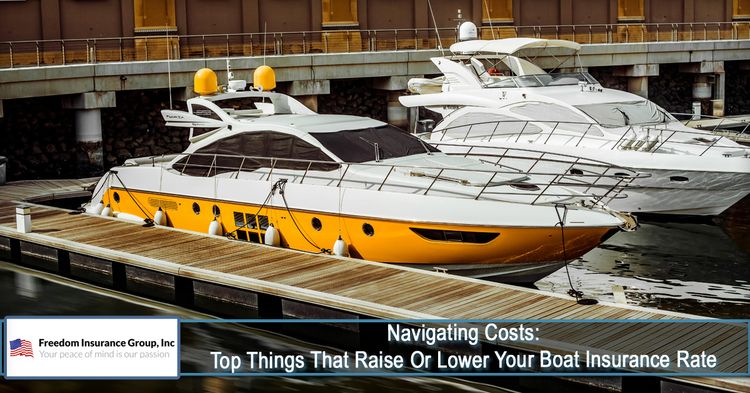
Owning a boat opens the door to adventure, relaxation, and unforgettable memories on the water. But just like cars and homes, boats come with financial responsibilities—including boat insurance. Whether you sail on lakes, cruise the coast, or fish offshore, having proper coverage is essential to protect your vessel, your passengers, and your liability.
However, boat insurance premiums can vary widely, depending on several factors. Understanding what affects your rate can help you make smart choices—and possibly save money in the long run.
Why Boat Insurance Matters
Boat insurance provides financial protection in case of:
- Accidents or collisions
- Storm or fire damage
- Theft or vandalism
- Liability for injuries or property damage
- Towing and emergency assistance
Most states don’t require boat insurance by law, but marinas, lenders, or your homeowners association might. And if something goes wrong on the water, having coverage can save you from serious out-of-pocket expenses.
What Affects Your Boat Insurance Rate?
Let’s break down the top factors that raise or lower your premium, so you can better navigate the costs of protecting your watercraft.
1. Type, Size, and Value of the Boat
- Larger, faster, or more expensive boats generally cost more to insure.
- Personal watercraft (e.g., Jet Skis) may carry higher premiums due to increased accident risk.
- Custom or high-performance boats may require specialized coverage.
Tip: The more power and luxury features your boat has, the more you’ll likely pay.
2. How and Where You Use It
- Saltwater vs. freshwater: Saltwater use typically increases premiums due to corrosion and maintenance risk.
- Navigational limits: Insurance may cost more if you operate in high-risk areas like coastal zones or hurricane-prone regions.
- Year-round vs. seasonal use: Storing your boat in the off-season may lower your rate.
Be honest about where and how often you use your boat—misrepresenting use can void claims.
3. Operator’s Experience and Driving Record
- Insurance providers consider your boating experience and any prior claims.
- A clean boating and driving record can reduce your rate.
- Taking a boating safety course may qualify you for a discount.
Accidents, DUIs, or violations—on land or water—can raise your premiums.
4. Coverage Limits and Deductibles
- Higher liability limits and comprehensive coverage cost more—but offer better protection.
- Choosing a higher deductible can lower your premium, but increases out-of-pocket costs if you file a claim.
Balance your deductible with what you could realistically pay in an emergency.
5. Safety Equipment Onboard
Installing approved safety and anti-theft devices can reduce your insurance rate. Examples include:
- GPS tracking systems
- Automatic fire suppression systems
- Burglar alarms or kill switches
- VHF radios and emergency beacons
More safety = less risk for insurers.
6. Storage and Mooring Location
Where you store your boat makes a big difference:
- Indoor, dry storage or a private boathouse often lowers risk.
- Keeping your boat in a marina year-round or on a trailer in a driveway may affect the premium differently.
- High-crime or weather-risk zones can raise rates.
Always notify your insurer if your storage location changes.
7. Bundling and Discounts
Many insurers offer multi-policy discounts if you:
- Bundle your boat insurance with auto, home, or umbrella policies
- Have a clean claims history
- Pay annually instead of monthly
Ask about loyalty, no-claims, or multi-boat discounts if you own more than one vessel.
What Can Raise Your Premium?
Here’s a quick list of things that typically increase your boat insurance costs:
- High-performance or speed-focused models
- Older boats with outdated systems
- Previous claims or boating violations
- Use in high-risk areas (storms, hurricanes)
- Inadequate safety equipment
- Using the boat for commercial purposes (e.g., charters, rentals)
What Can Lower Your Premium?
To help reduce your boat insurance costs:
- Complete a boating safety course (often required for younger boaters)
- Install safety and security features
- Store your boat safely during off-season months
- Maintain a clean boating record
- Bundle insurance policies with the same carrier
- Review and adjust your deductible or coverage annually
Final Thoughts: Smart Planning Leads to Smoother Sailing
Boat insurance isn’t just about compliance—it’s about peace of mind. By understanding what affects your rate and taking proactive steps to reduce risk, you can customize your coverage, avoid surprises, and potentially save hundreds of dollars a year.
Pro Tip: Work with a marine insurance specialist to find the right coverage for your vessel, lifestyle, and budget. They’ll help navigate the fine print—and make sure your time on the water stays smooth.
At Freedom Insurance Group, Inc., we aim to provide comprehensive insurance policies that make your life easier. We want to help you get insurance that fits your needs. You can get additional information about our products and services by calling our agency at 828-322-7474. Get a free quote today by CLICKING HERE.
Disclaimer: The information presented in this blog is intended for informational purposes only and should not be considered as professional advice. It is crucial to consult with a qualified insurance agent or professional for personalized advice tailored to your specific circumstances. They can provide expert guidance and help you make informed decisions regarding your insurance needs.
